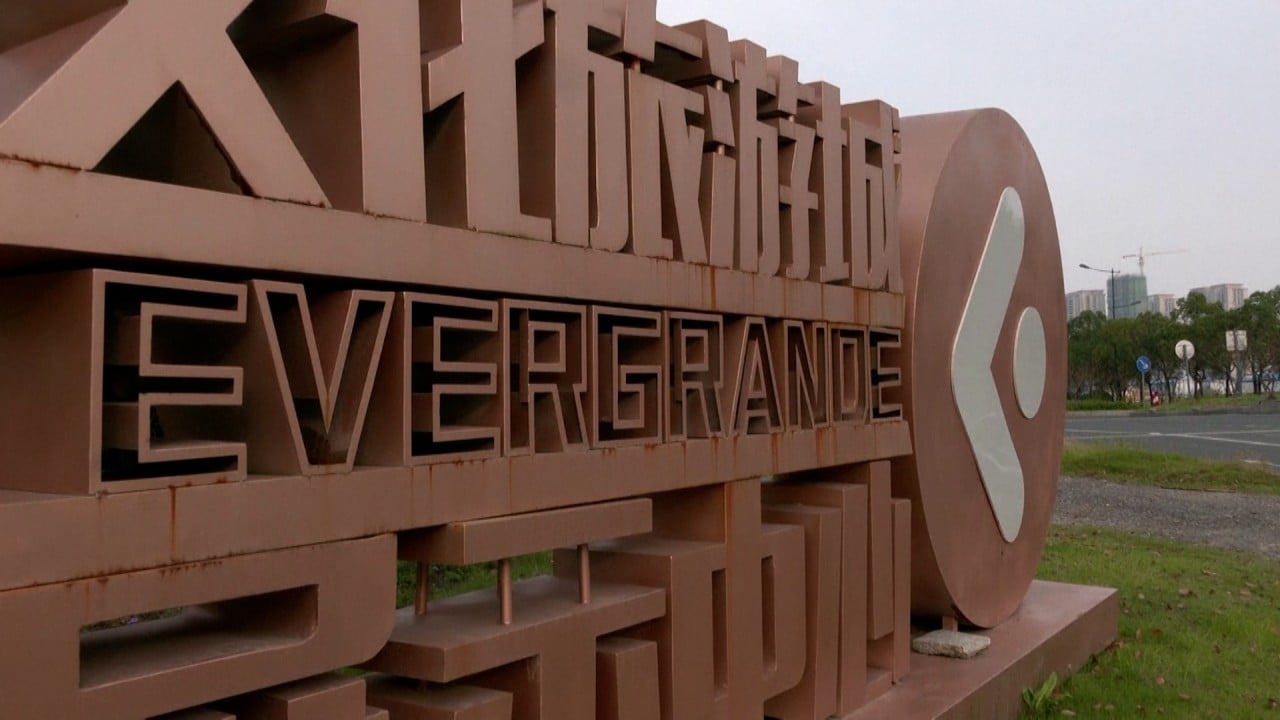
01:46
World’s most indebted developer, China Evergrande Group, buys time to repay more creditors

Evergrande, once China’s largest property developer by sales, last week indicated its inability to meet guarantee obligations on its US dollar debts. Since then, Guangdong and other provincial governments where Evergrande Group and its affiliates have housing projects have announced they are providing advice and guidance, indicating a restructuring process will be handled in an orderly manner according to the law.
The China Banking and Insurance Regulatory Commission also issued a press release, noting that an Evergrande default will not have negative impact on the operations of China’s banking and insurance sector.
When news of Evergrande’s difficulties in meeting its obligations surfaced, some analysts suggested a default could be China’s “Lehman moment”. This implied there could be systemic contagion along the lines of the cascading failure of Lehman Brothers, which triggered the 2008 global financial crisis.
Although Evergrande’s debt is large at about 2 trillion yuan (US$313.7 billion), its financial debts account for around a third of its total liabilities with a diversified creditor structure. The larger amount owed outside the banking sector is because of the peculiar funding structure of China’s real estate model.
Chinese property development typically relies heavily on presale deposits from buyers and mortgage instalment payments to fund their housing development projects. The exposure to domestic financial institutions is relatively low and more diversified because of the regulatory restrictions within China on credit concentration.
Some Chinese property developers have relied on US dollar bonds, issued mainly in Hong Kong, to meet their funding needs in recent years. They pay market interest rates on bonds with credit ratings. Since many such bonds are rated below investment grade, the market is transparently assessing the risk-reward balance for such credits.
In the United States, junk bond yields rose above 9 per cent in March 2020 at the height of pandemic volatility but are now trading at between 4 per cent and 5 per cent. Chinese real estate offshore bond yields fluctuated between 6 per cent and 10 per cent from 2017 to 2019 but rose to around 15 per cent this year on higher credit risks. The risks of default on these Chinese bonds are largely priced into the market.
There does not appear to be any contagion spillover as the yields for non-real-estate Chinese US dollar bonds are steady at between 3 per cent and 4 per cent. This shows the market is differentiating between real estate and non-real-estate issuers in terms of credit perceptions.
We need to look at Evergrande within the larger context of Chinese economic and financial reforms. Chinese property developers began to reduce their borrowing when authorities decided to slow the growth of overall domestic debt.
Because the housing sector is important to social and financial stability, an orderly reduction in leverage and house price growth is fundamental to overall stability. This protects the market for homebuyers in terms of affordability, as well as investors.
What is encouraging is that the authorities have taken a market-oriented, rules-based approach towards managing credit events such as the Evergrande default. First, allowing market forces to work – including the exit or restructuring of non-performing players – with yields that reflect market risks is critical to developing efficient, transparent markets.
Second, local authorities have prioritised managing risks to homebuyers by ensuring their interests are taken into consideration. Third, Chinese authorities have affirmed that “there will be no change for China’s market-oriented financial reform and opening-up under the rule of law and in accordance with international standards”, a sign of confidence in markets and reform.
Finally, by stating clearly that there will be an orderly unwinding that follows market-based and legal principles, the authorities confirmed the fundamental principle of not allowing moral hazard to weaken market discipline.
In other words, even the largest players cannot assume they are too big to fail. Allowing borrowers to fail or be restructured is good market discipline. Markets cannot work well when private owners profit in good times and the public picks up the bill in bad times.
There will be no Lehman moment in China. China’s economic growth and net worth are positive, savings remain high and the financial system is well-capitalised.
McKinsey’s latest Global Balance Sheet report estimated that, for 2020, China’s national net worth at market prices was 8.2 times GDP, nearly double that of the US and higher than Japan and Germany, the other two economies with large surpluses. China’s net international investment position was a surplus of about US$2 trillion at the end of June, compared with a US net liability of US$15.4 trillion.
In this volatile global environment awash with excess liquidity, it is a mark of confidence that Chinese authorities are embarking on a “steady as she goes” policy mix aimed at providing stability and orderly markets.
Andrew Sheng is a distinguished fellow at the Asia Global Institute, University of Hong Kong, and a former financial regulator